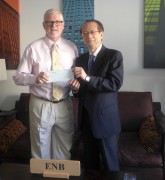A seminar held by the Taipei Economic and Cultural Organization (TECO) and the Academic Council of the United Nations System (ACUNS) discussed the way forward for the post-2015 development agenda and possible avenues for its improvement.
Titled 'Another Viewpoint on Planning Post-2015 SDGs,' the event took place on 11 October 2013 in New York, US, focused on the process to determine Sustainable Development Goals (SDGs).
 11 October 2013: A seminar organized by the Taipei Economic and Cultural Organization (TECO) and the Academic Council of the United Nations System (ACUNS) discussed the way forward for the post-2015 development agenda and possible avenues for its improvement. Titled ‘Another Viewpoint on Planning Post-2015 SDGs,’ the event took place on 11 October 2013 in New York, US, and brought together Member State representatives, academics and representatives of civil society to discuss the process to determine Sustainable Development Goals (SDGs).
11 October 2013: A seminar organized by the Taipei Economic and Cultural Organization (TECO) and the Academic Council of the United Nations System (ACUNS) discussed the way forward for the post-2015 development agenda and possible avenues for its improvement. Titled ‘Another Viewpoint on Planning Post-2015 SDGs,’ the event took place on 11 October 2013 in New York, US, and brought together Member State representatives, academics and representatives of civil society to discuss the process to determine Sustainable Development Goals (SDGs).
In the first keynote address, Tapio Kannien, City University of New York, called for a post-2015 development agenda that takes into account future crises due to global climate change. Kannien said the recommendations presented by the UN High-Level Panel on the Post-2015 Development Agenda (HLP) are not strong enough to deliver change. He called for goals that avoid a “business-as-usual” approach, and said global emergencies require political and economic changes through the creation of “a new world order.” Kannien challenged participants to begin thinking about post-2050 goals, and what a changing world will require.
Kate Offerdahl, IISD, delivered the second keynote address in a presentation on ‘Possibilities for Post-2015.’ She recounted how the post-2015 and SDG discussions have developed over the past two years, and summarized the next steps before concluding in 2015 with a High-Level Summit. Offerdahl highlighted a number of issue areas as important for a new development agenda, including: making the agenda truly universal; expanding on concept of environmental sustainability; including the voices of the most excluded peoples; creating partnerships and an institutional home for implementation; and effectively communicating the agenda to the global public. She called on the UN to create meaningful goals with future generations in mind, saying, “the post-2015 development agenda will never be effective unless the interests of young children and generations to come have their interests reflected in the goals.”
Following the keynote presentations the Permanent Representatives of Belize, Palau, and Saint Vincent and the Grenadines participated in a panel discussion, and an interactive dialogue among participants addressed climate change adaptation and small island developing States (SIDS), marketing the post-2015 development agenda, and the role of the High-level Political Forum on Sustainable Development (HLPF). [Event Programme] [ACUNS Website]